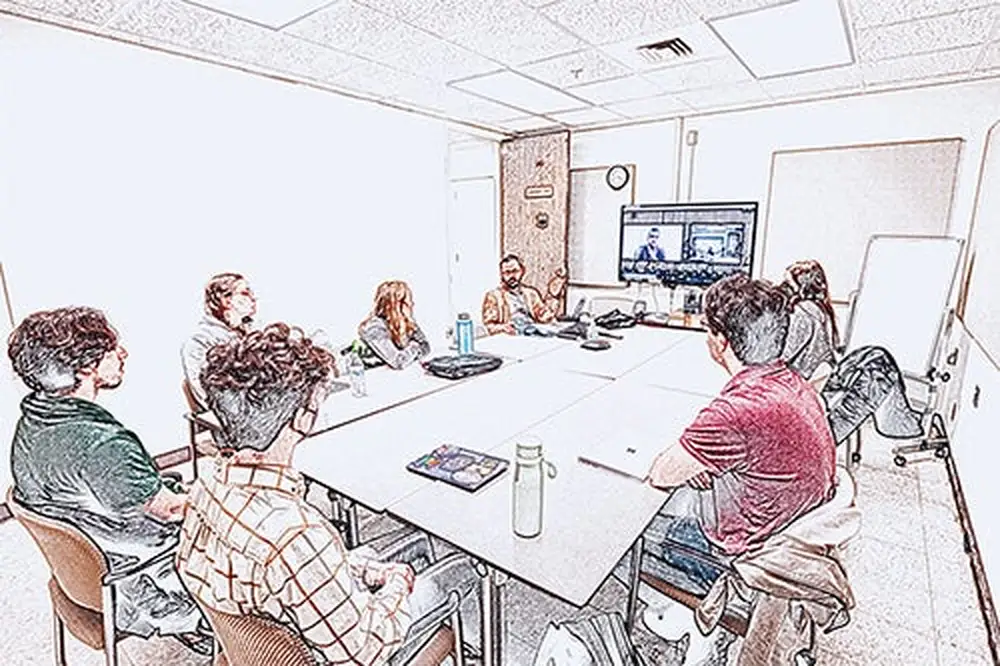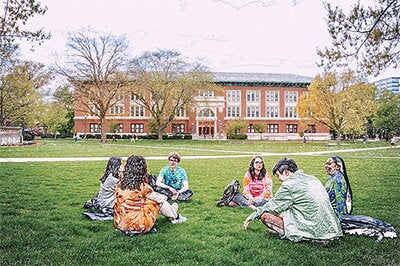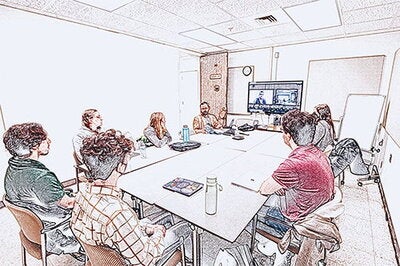

Classes moved from classrooms to computer screens, trips and gatherings were put on hold, and an entirely different kind of learning experience ensued after the momentous onset of the COVID-19 pandemic. Even now, five years later, campus continues to feel its effects—and not in entirely bad ways. Some ways of doing things were improved.
Entomology associate professor Alexandra Harmon-Threatt taught Race and Environmental Biology at the start of the pandemic and noticed a change not only in the way she taught but what she taught.
“I think the pandemic really highlighted a lot of racial issues. In 2020, the pandemic was immediately paired with the Black Lives Matter movement and police brutality,” she said. “Students were very cognizant of racial and ethnic biases and how those can be justice based and codified in the law. Instead of having to introduce this idea, they were
very attuned to (it).”
A flexible and open-minded approach to instruction marked Harmon-Threatt’s teaching throughout and after the pandemic, as she received a 2024 LAS teaching award. Since the pandemic, Harmon-Threatt has focused on fostering class discussions.
Communication professor Charee Thompson, who received a 2024 LAS teaching award, teaches topics such as health communication in relationships, invisible illness, and healthcare communication. During the pandemic the topics were particularly relatable, which Thompson turned into a tool for deeper engagement that she continues to use to this day.

“I didn’t find it difficult to foster class discussions if I provided the right kinds of prompts and gave students the space to talk to one another,” she said. “Many wanted to mitigate feelings of isolation through class participation.”
Rylee Tomasik, a psychology major, continues to see the effects of the restrictions students faced during the pandemic.
“Technology and remote learning platforms are viewed as more commonplace and acceptable,” Tomasik said. “We’re also much more aware of the privilege of getting to go to these classrooms in person.”
She added; “One thing we gained, as students, through this experience of learning through different challenges was better adaptability and feeling comfortable to try to connect with our teachers and peers during a hard time for everyone.”
LAS teaching award recipient Brian Dill, a professor of sociology, teaches courses ranging from Introduction to Poverty to Impacts of Globalization. After the onset of the pandemic, four of Dill’s own children were confined to Zoom for class discussions. He used their experiences as a motivator to create new methods of active class engagement that he continues to use today.
“Over my 15 years at Illinois, my enthusiasm has consistently been mentioned in student feedback, and I think this shows the importance and contagious nature of enthusiasm in the learning environment,” Dill said.
He added: “The pandemic challenged us to rethink student engagement, and in many ways, it reinforced the idea that meaningful learning happens through active participation, whether in person or online.”
Changes occurred outside of the classroom as well. Gretchen Pein is senior assistant dean in the College of LAS Student Academic Affairs Office (SAAO), which serves about 12,000 students. The office operations became fully virtual for three semesters after the onset of COVID-19, and Pein spent a lot of time finding ways to reach and support students.
“It was a challenge,” Pein said. “We had to move everything online, increase availability so we could
meet students’ needs, and add more information on our website regarding tutoring and mental health resources.”
Long-term, however, the efforts during the pandemic increased students’ ability to access information and connect with mental health resources. Zoom meetings became a convenient new option for students to meet with staff members. Academic forms such as the minor declaration form were moved from paper to online.
Wellness workshops are now paired with more amenities and resources than ever before. When the office in Lincoln Hall reopened in 2021, staff members started making available free snacks and crafts to help students relax.
A major new addition to their office is their free student food pantry, created after surveying student needs. Fully funded by donations, the pantry has been open since fall 2024 and provides students with a “no questions asked” option to take any food items
they need.
Pein said that, related to the pandemic, the office has also helped develop student engagement reports that allow instructors or advisors to share with SAAO any concerns about student attendance or performance. The office then reaches out to those students and help them communicate with their professors about issues they may be having.
“The reports have become a really useful tool even after the pandemic because we can reach out to students or work with the Office of the Dean of Students,” Pein said. “It’s one of those many times where a lot of campus units are working together to make sure students are okay.”
In a roundabout way, Pein said, the pandemic helped advance what she wants to do with her career.
“If I can make just one day easier or a task easier for someone or just make someone feel like they succeeded at something, then that’s pretty cool for me,” she said.
Editor's note: This story first appeared in the Spring 2025 issue of The Quadrangle.